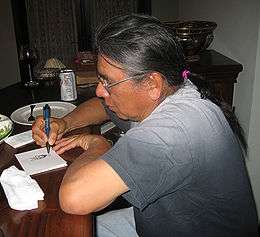Absentee-Shawnee Tribe of Indians
|
official tribal flag | |
| Total population | |
|---|---|
| 3,050[1] | |
| Regions with significant populations | |
|
| |
| Languages | |
| Shawnee, English, Yuchi | |
| Religion | |
|
Christianity, Native American Church, traditional tribal religion | |
| Related ethnic groups | |
| Eastern Shawnee Tribe of Oklahoma, Shawnee Tribe, and Sac and Fox |
The Absentee-Shawnee Tribe of Indians of Oklahoma (or Absentee Shawnee[2]) is one of three federally recognized tribes of Shawnee people in Oklahoma.[3]
Tribal government
The Absentee-Shawnee Tribe is headquartered in Shawnee, Oklahoma, and its tribal jurisdictional area is in Cleveland and Pottawatomie Counties. There are 3,050 enrolled Absentee-Shawnee, with 2,315 living within the state of Oklahoma. The tribe operates its own housing authority and issues tribal vehicle tags. They own a gas station, two smoke shops, a casino, and the AST Country Kitchen Restaurant, located in Norman, Oklahoma.[1] Their casino, Thunderbird Casino, is located east of Norman, Oklahoma and includes the Rednecks Cafe, the Chuck Wagon Snack Bar, and the Jockey Club.[4] Their estimated annual economic impact is $6,353,722.[1]
The tribe is governed by a democratically elected executive committee. Their current administration includes the following:
- Governor: Edwina Butler-Wolfe
- Lieutenant Governor: Isaac Gibson
- Secretary: John Raymond Johnson
- Treasurer: Leah Bates
- Representative: Kenneth Blanchard[5]
History

The Shawnee are an Algonquian-speaking people from the Eastern United States. At the time of European encounter, various bands were living in present-day Ohio, Alabama and other areas of the Southeast.
During the American Revolutionary War, many Shawnee moved from Ohio to Cape Girardeau, Missouri, then in Spanish Louisiana. They evaded the Northwest Indian Wars that followed the revolution. These Shawnee were later joined by others from Alabama and Ohio. Moving southward, they settled in present-day Arkansas, Texas, and Louisiana. After the United States made the Louisiana Purchase in 1803, relations began to change. In 1825 the US offered the tribe a reservation in the Kansas territory in exchange for the lands they occupied. Instead, these scattered Shawnee groups migrated to Indian Territory. Collectively they became known as the "Absentee Shawnee."[6]
By 1867 the Eastern Shawnee were living with the Seneca in Missouri. Later in the century, both groups were removed to Indian Territory (present-day Oklahoma).[7] On June 26, 1890, the tribe signed an agreement with the Cherokee Commission for individual allotments.[8]
The Loyal Shawnee were removed from Ohio to Kansas, where they were incorporated within the Cherokee Nation, who were, however, Iroquoian speakers. Black Bob's band initially refused to be removed from Missouri to Kansas. Ultimately, they were forced to do so and joined the other tribes. In the 20th century, the Shawnee reorganized and revived their distinct group traditions, and in 2000 the Loyal Shawnee received separate federal recognition as the Shawnee Tribe.
Many members are of the Yuchi ethnicity, and a few speak the Yuchi language.[9]
In 1872, US Congress gave the Absentee Shawnee title to the lands they occupied on the Citizen Potawatomi Nation-Absentee Shawnee Oklahoma Tribal Statistical Area (OTSA). Part of this is the Absentee-Shawnee's tribal jurisdictional area today.[6][10]
In the late 19th century, Wild Turkey led a band of Absentee Shawnee who favored assimilation, while Big Jim led a band of traditionalists. The tribe's lands were broken into individual allotments in 1890, and the government recorded its members on the Dawes Rolls.
In 1936, the tribe reorganized and gained federal recognition under the new Oklahoma Indian Welfare Act.[6] They ratified their constitution and by-laws on December 5, 1938.[11]
Language
The tribe created the Cultural Preservation Department to support cultural and language preservation. They offer a Shawnee language class.[12] According to the Intertribal Wordpath Society, 200 to 800 people still spoke the Shawnee language in Oklahoma as of 2006.[13] Pauline Wahpepah, a fluent native speaker, teaches Shawnee for the tribe.[14]
Notable Absentee Shawnee
- Benjamin Harjo, Jr., painter and printmaker
- Ernest Spybuck (1883–1949), artist and autoethnographer
| Preceded by George Blanchard |
Absentee Shawnee Tribal Governor 2013–Present |
Succeeded by Edwina Butler-Wolfe |
See also
Notes
- 1 2 3 2011 Oklahoma Indian Nations Pocket Pictorial Directory. Oklahoma Indian Affairs Commission. 2011: 3. Retrieved 2 Jan 2012.
- ↑ Article I of the Constitution of the Absentee Shawnee Tribe of Indians of Oklahoma (retrieved 20 Feb 2010) states "The name of this federally recognized Indian tribe shall be the Absentee-Shawnee Tribe of Indians of Oklahoma," although the rest of the document (including its title) uses "Absentee Shawnee."
- ↑ "Contact Us." Absentee Shawnee Tribe of Oklahoma. Retrieved 31 Dec 2009.
- ↑ Thunderbird Casino. 500 Nations. 2009 (retrieved 10 Mar 2009)
- ↑ "Executive Committee." Absentee Shawnee Tribe. (retrieved 6 Dec 2013)
- 1 2 3 Smith, Pamela A. "Shawnee, Absentee." Oklahoma Historical Society's Encyclopedia of Oklahoma History and Culture. (retrieved 31 Dec 2009)
- ↑ Shawnee History. The Shawnee Tribe. (retrieved 6 Feb 2009)
- ↑ Deloria Jr., Vine J; DeMaille, Raymond J (1999). Documents of American Indian Diplomacy Treaties, Agreements, and Conventions, 1775-1979. University of Oklahoma Press. pp. 328–331. ISBN 978-0-8061-3118-4.
- ↑ "American Indian and Alaska Native Tribes in the United States and Puerto Rico: 2010 (CPH-T-6)". census.gov. Census Bureau. 2010. Retrieved September 14, 2016.
- ↑ Marilyn K. Nicely, Law/Tech Librarian (1999). "The Absentee Shawnee Tribe of Oklahoma - Legal Codes". University of Oklahoma Law Center. Archived from the original on 6 November 2007. Retrieved October 8, 2007.
- ↑ "Constitution and By-Laws of the Absentee-Shawnee Tribe of Indians of Oklahoma." University of Oklahoma Law Center. (retrieved 31 Dec 2009)
- ↑ "Cultural Preservation." Absentee Shawnee Tribe. (retrieved 31 Dec 2009)
- ↑ Anderton, Dr. Alice. "Status of Indian Languages in Oklahoma." Intertribal Wordpath Society. (retrieved 31 Dec 2009)
- ↑ "Board of Directors." Intertribal Wordpath Society. (retrieved 31 Dec 2009)
External links
- Absentee Shawnee Tribe, official website
- Absentee Shawnee, Oklahoma Historical Society
- Shawnee History, Access Genealogy
- BIA list of Federally Recognized Tribes